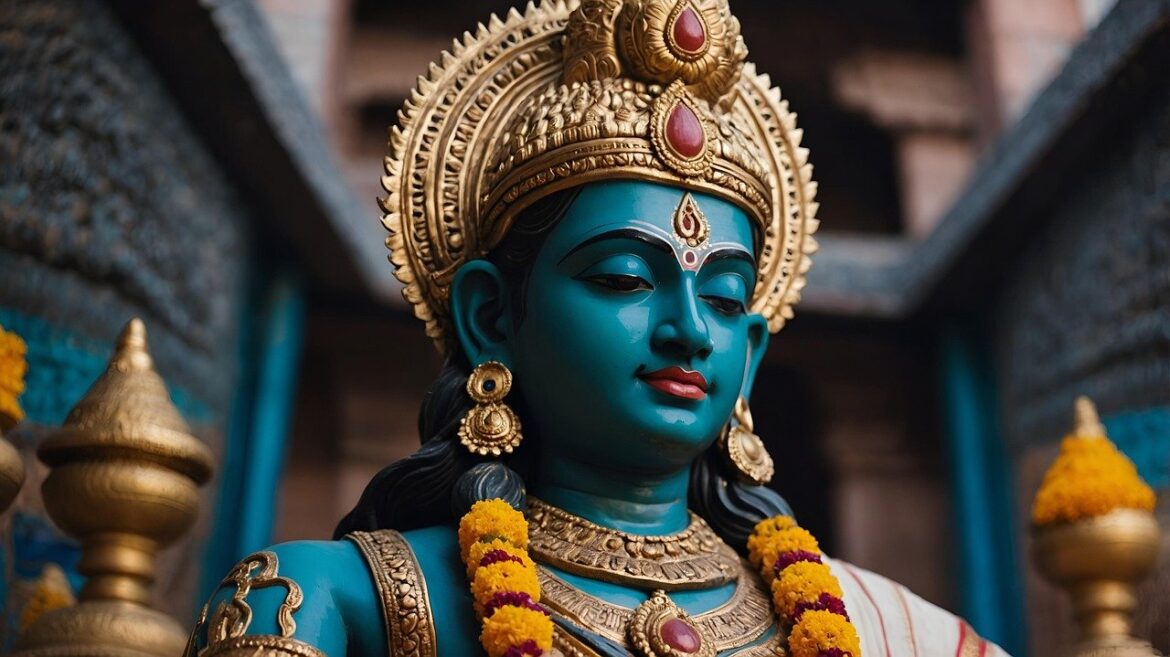Hinduism is a false religion according to the Bible, leading people away from salvation in Jesus Christ. Only through faith in Christ alone can humanity be saved from sin and eternal separation from God.
Introduction: The Origin and Spread of Hinduism
Hinduism is among the oldest global religions, originating around 1500 B.C. in the Indus Valley region, now modern-day India and Pakistan. Over thousands of years, it evolved from a blend of cultural, spiritual, and philosophical progress among ancient Indian people, without a single founder. Currently, India and Nepal are the primary places where Hinduism is practiced, along with large communities in Bangladesh, Sri Lanka, and among Indians abroad.
Hinduism comprises a vast array of gods, rituals, philosophies, and paths to “moksha” (liberation). However, according to the Bible, Hinduism is a false religion filled with idolatry, deception, and demonic influence (1 Corinthians 10:20). It contradicts the truth of God’s Word and the salvation offered only through Jesus Christ (John 14:6). Hindus are spiritually lost and in desperate need of the Gospel of Jesus, which is the power of God unto salvation (Romans 1:16).
Below are 30 practices and beliefs within Hinduism that reveal its spiritual error compared to the truth found only in Christianity.
1. Polytheism vs. One True God
Hinduism: worships millions of gods and goddesses (e.g., Vishnu, Shiva, Lakshmi).
Christianity: Declares one true God—Yahweh, the Creator of all (Deuteronomy 6:4; Isaiah 45:5).
“You shall have no other gods before Me.” — Exodus 20:3
2. Idolatry and Image Worship
Hinduism: Uses carved idols and images in daily worship (puja).
Christianity condemns idolatry as sin (Exodus 20:4–5; Romans 1:23).
“Little children, keep yourselves from idols.” — 1 John 5:21
3. Reincarnation vs. Resurrection
Hinduism teaches that the soul reincarnates in different bodies.
Christianity: Teaches resurrection and eternal judgment (Hebrews 9:27; John 5:28–29).
4. Karma vs. Grace
Hinduism: Believes one’s actions (karma) determine one’s next life.
Christianity: Salvation is by grace through faith, not by works (Ephesians 2:8-9).
5. Moksha vs. Eternal Life in Christ
Hinduism: Seeks liberation (moksha) from the cycle of rebirth through self-effort or enlightenment.
Christianity: Eternal life is a gift through Jesus (Romans 6:23).
6. Pantheism vs. Personal God
Hinduism: Teaches that God is everything and everything is God.
Christianity teaches that God is distinct from His creation, holy and personal (Genesis 1:1; Isaiah 6:3).
7. Ritual Cleansing vs. the Blood of Jesus
Hinduism: Performs ritual baths in rivers, such as the Ganges, for purification.
Christianity: Only the blood of Jesus can wash away sins (1 John 1:7; Revelation 1:5).
8. Caste System vs. Equality in Christ
Hinduism: Supports a caste hierarchy dividing people into rigid social classes.
Christianity: Teaches all are equal before God (Galatians 3:28; Acts 10:34-35).
9. Worship of Nature and Animals
Hinduism venerates cows, monkeys, snakes, and rivers as sacred.
Christianity: Teaches worship of the Creator, not the creation (Romans 1:25).
10. Astrological Superstition
Hinduism: Relies on astrology and horoscopes for guidance.
Christianity: Prohibits divination and looks only to God (Deuteronomy 18:10–12).
11. Multiple Scriptures vs. the Bible
Hinduism: Uses the Vedas, Upanishads, Bhagavad Gita, and more.
Christianity: Recognizes the Bible alone as God’s inspired Word (2 Timothy 3:16).
12. Salvation Through Self vs. Salvation Through Christ
Hinduism: Promotes various paths (yogas) for self-salvation.
Christianity: Declares Christ as the only way to God (John 14:6; Acts 4:12).
13. Worship of False gods
Hinduism: Devotes life to deities that are not real gods.
Christianity teaches that such worship is demonic (1 Corinthians 10:20).
14. Pilgrimage to Holy Sites
Hinduism: Requires pilgrimages to places like Varanasi.
Christianity: No pilgrimage saves—only faith in Christ saves (Romans 10:9-10).
15. Sacred Cows and Animal Veneration
Hinduism views cows as sacred and considers them to be off-limits for harm.
Christianity: Teaches animals are created for man’s benefit, not worship (Genesis 1:26–28).
16. Burning Incense to Idols
Hinduism: Uses incense in idol worship.
Christianity: Such acts are an abomination to God (Isaiah 1:13; Jeremiah 44:3–5).
17. Belief in Avatars (God’s Incarnations)
Hinduism: Claims gods take avatars (e.g., Krishna).
Christianity: God took on flesh once in Jesus Christ (John 1:14), never multiple avatars.
18. Mantras and Chanting
Hinduism: Repeats mantras to achieve spiritual awakening.
Christianity: Teaches to pray in understanding, not in vain repetitions (Matthew 6:7).
19. Worship Based on Fear, Not Relationship
Hinduism often involves appeasing gods through offerings and rituals.
Christianity: Offers a personal relationship with a loving Father (Romans 8:15).
20. Emphasis on Works Righteousness
Hinduism: Depends on good deeds for a better rebirth.
Christianity: Emphasizes faith in Christ for justification (Romans 5:1).
21. Embracing All Paths as Valid
Hinduism: Claims all religions lead to God.
Christianity: Jesus is the only Way (John 14:6). No other name saves (Acts 4:12).
22. Lack of Assurance of Salvation
Hinduism: Offers no certainty of liberation.
Christianity: Provides full assurance of salvation in Christ (1 John 5:13).
23. Human Deification
Hinduism: Claims that humans can become divine.
Christianity: Man reflects God’s image, but doesn’t become God (Isaiah 43:10).
24. Spiritual Blindness and Darkness
Hinduism: Leads people away from the Light of truth.
Christianity: Christ is the Light of the world (John 8:12; 2 Corinthians 4:4).
25. Acceptance of Multiple Contradictory Beliefs
Hinduism is pluralistic and contradictory in its doctrine.
Christianity rests upon the truth that is absolute and unchanging (John 17:17).
26. Emphasis on Earthly Prosperity and Blessings
In Hinduism, people worship gods for health and wealth.
Christianity: Focuses on eternal treasure in heaven (Matthew 6:19-21).
27. Self-Realization vs. Christ-Realization
Hinduism: Teaches that the self is divine.
Christianity: Teaches that only Christ is divine, and we are sinners needing redemption (Romans 3:23).
28. Ritual Fasts to Please Deities
In Hinduism, people fast as offerings for divine favor.
Christianity: Fasting is for humbling before God, not manipulation (Matthew 6:16-18).
29. Marriage to Idols and Spirits
Hinduism: Some traditions involve marrying images or spirits.
Christianity: Such acts are forbidden and spiritually dangerous (Leviticus 19:31).
30. Denial of Sin and the Need for Atonement
Hinduism: Does not acknowledge original sin or the need for a Savior.
Christianity: Teaches that all have sinned and need redemption through Jesus’ blood (Romans 3:23–25).
The Need for the Gospel Among Hindus
Many Hindus go through their lives without ever being exposed to the valid message of the Gospel. They engage in various rituals, venerate idols, and seek salvation through means that ultimately cannot be fulfilled without the grace found in the cross of Jesus Christ.
“How then shall they call on Him in whom they have not believed? And how shall they believe in Him of whom they have not heard?” — Romans 10:14.
Christians must pray for Hindus, share the Gospel with boldness, and send missionaries to preach the only message that can save them:
“For there is one God and one Mediator between God and men, the Man Christ Jesus, who gave Himself a ransom for all.” — 1 Timothy 2:5–6
Conclusion: Jesus Christ Alone Saves
Hinduism, despite its antiquity and cultural richness, is a false religious system that keeps millions in spiritual bondage. It offers no real hope, no Savior, and no forgiveness. But Jesus Christ offers eternal life freely to all who believe in Him.
“He who believes in the Son has everlasting life; and he who does not believe the Son shall not see life, but the wrath of God abides on him.” — John 3:36
Every Christian should be deeply inspired and motivated to reach out to the Hindu world, sharing the transformative message of the Gospel. Every Hindu must have the opportunity to encounter this truth, so they may turn from their past, repent, and embrace Jesus Christ as their Savior, finding hope and salvation in Him.
“Repent therefore and be converted, that your sins may be blotted out.” — Acts 3:19




